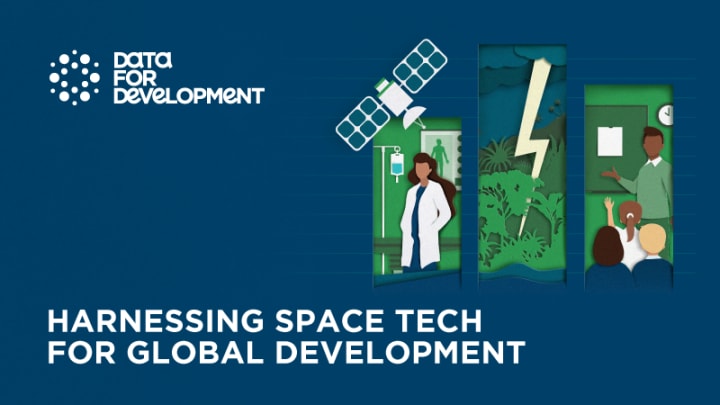
BARCELONA — While nations around the world grapple with how to best respond to the COVID-19 pandemic, many low-income countries in Africa now face a triple threat. In addition to the health and economic challenges posed by the virus, a locust infestation is decimating crops in East Africa and putting the food security of millions of people in peril.
Space tech is helping conservation efforts better inform development in Africa
Satellites have been used in Africa to prevent poaching; monitor deforestation and grassland degradation; and prevent uncontrollable wildfires.
At a time when social distancing and travel restrictions challenge traditional responses, development specialists are increasingly relying on satellite data to monitor swarms, breeding grounds, and the environmental conditions that might lead to new invasion.
This is just one of the ways that data is being used to respond to various development challenges throughout the continent. Because satellite data is cheaper and easier to access than ever before, it has become a key tool that scientists can use to tackle a range of important development issues by combining geospatial data with other sources, such as population data and censuses.
In fact, a recent study on the status of Earth observation and geoinformation sciences in Africa found that, over the past 20 years, the continent has witnessed a steady advancement in space-based technologies that are “increasingly recognized as an essential tool for decision-making that can leapfrog African development.”
However, harnessing their potential requires data training and literacy on a massive scale — among university students, who will become the next generation of data scientists, as well as government officials looking to use data for improved decision-making. Today, universities across Africa are trying to fill that gap by ramping up their data science degrees and providing shorter 101 courses to policymakers and professionals in the development sector.
“The field has already presented great opportunities for solving real-world issues. Now, universities need to collaborate with the end users to build data applications if they are to really solve challenges on the ground,” said Joyce Nakatumba-Nabende, lecturer and head of the artificial intelligence lab at Makerere University in Kampala, Uganda.
The biggest barriers to advancing satellite data
Data literacy and capacity are currently the biggest barriers preventing policymakers from making data-driven decisions to improve policies and their outcomes, according to Emmanuel Nkurunziza, director general of the Regional Centre for Mapping of Resources for Development — an intergovernmental organization supporting its 20 member states across Africa with geoinformation and technologies for sustainable development.
Nkurunziza noted that once policymakers have been sensitized to the potential of satellite data, then technical equipment and computing infrastructure, such as connectivity, can be addressed. This would make satellite data accessible for applications in development efforts ranging from agriculture to natural resource monitoring and management, he said. For example, satellites can be used to help countries remotely monitor their crops to create yield estimation and food balances, among other applications.
“Agriculture and food security are one of the key areas where we do a number of activities that support countries in crop monitoring,” he said.
Educating the next generation of data scientists
One way that universities are supporting the scale-up of the practical applications of satellite data for development is to offer more data science-focused programs. “Historically, if one wanted to be a data scientist, they would either go study a statistics degree or they might do a computer science degree,” said Kanshukan Rajaratnam, director of the newly formed School for Data Science and Computational Thinking at Stellenbosch University in South Africa.
This was problematic, however, because such programs did not necessarily link data to real-world issues. “However, more universities have now started to offer data science-focused programs,” Rajaratnam said.
“We need to make sure that — as we're coming up with these applications — that they are actually meeting the problem of the people.”
— Joyce Nakatumba-Nabende, artificial intelligence lab head, Makerere UniversitySolutions to these issues are already coming out of these programs. The artificial intelligence lab at Makerere University, for example, has developed an application to help farmers diagnose plant diseases. According to Nakatumba-Nabende, the application has been distributed to smallholder farmers who send images of their crops, which are then analyzed using artificial intelligence and machine learning to spot any new diseases, predict how they might spread, and ultimately help support the development of more resilient crop varieties.
While the results of the project have not yet been disseminated, Nakatumba-Nabende stressed that the farmers’ knowledge of different crops and diseases has increased. “It's really been able to help them combat the spread of diseases and to also increase their knowledge of diseases,” she said.
Despite these achievements, many university data departments are challenged by a lack of awareness of what data science can do across Africa and a lack of coordination between different data centers, according to Rajaratnam.
“I'm not talking in terms of research collaboration, but in terms of teaching collaboration,” he said. “Data science is [a] wide field, and you find expertise in different places — so how can we plug into each other’s expertise to develop the best students?”
Bringing solutions to scale through government partnerships
The best way to ensure that solutions from universities have a real-world application is by facilitating early and efficient communication between nonprofit organizations and government agencies at the design stage and by setting up a feedback loop between organizations, according to Nakatumba-Nabende.
“The university is producing great research, but for it to have a real impact, they need to work with others,” she said. For example, her university’s research lab works closely with Uganda’s agricultural research institute and hospitals to take the applications developed within the universities and apply them out in the field. Further promoting these types of collaborations with ministries, she said, should help link these different players together.
Beyond the training of students, universities should also educate government officials on how to use data for policy and decision-making, said Kenneth Mubea, a data scientist with the Global Partnership for Sustainable Development Data — one of the organizations behind the Africa Regional Data Cube. “We’ve actually made it mandatory [for] any training in any country,” he said. “I spend more time in the government offices trying to understand what they're doing and the challenges they have.”
During these training sessions he shares how the Africa Regional Data Cube is using satellite data to address issues around food security, deforestation, and urbanization and how governments can begin to use this data. “There's an issue of reassuring and empowering them, showing them the tools, and making it very easy for them to understand,” he said.
Additionally, several universities have started to offer shorter courses to government and nongovernmental organization workers about how they can use satellite technology and other big data to support policy formation, according to Nakatumba-Nabende.
She believes that locally trained data scientists who graduate from these programs will play a crucial role in designing solutions to the issues facing their communities. “We need to make sure that, as we're coming up with these applications, that they are actually meeting the problem of the people,” she said.
Visit the Data for Development series for more coverage on practical ways that satellite data can be harnessed to support the work of development professionals and aid workers. You can join the conversation using the hashtag #DataForDev.




